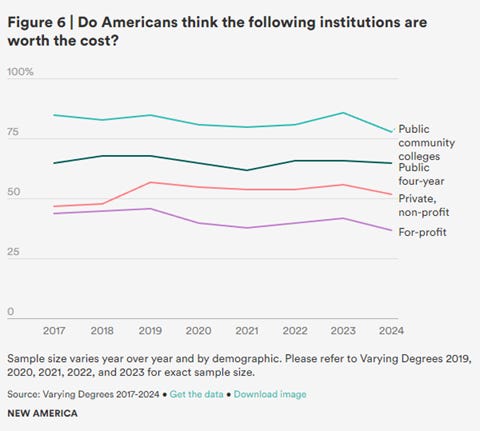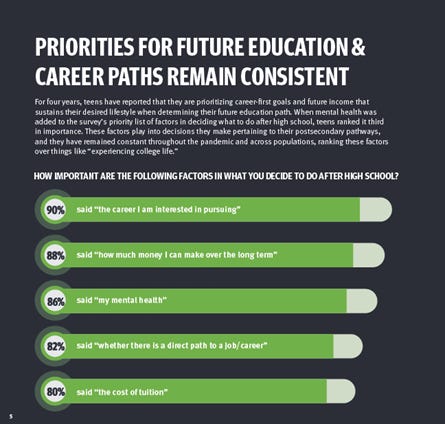Perceptions of the Value of College
The ‘value of college’ has increasingly been called into question and scrutinized by students and parents, employers, the press, legislators/government officials, and the general public with unprecedented intensity over the past decade. Headlines ask ‘is college worth it?’ and questions are raised about the cost and relevance of a college degree. Stories of students who have accumulated huge amounts of debt paying for their education – with no job prospects forthcoming – abound. Surveys document declining public support for higher education – both in spirit and in kind. What was once held up as the ticket to a better life – a college degree – is portrayed by many critics as a waste of time, money, and taxpayer dollars.
Source: Varying Degrees 2024, page 15.
Are these critics right about the ‘value’ of higher education – or do the benefits of a college degree exceed the cost?
Benefits of College: What Faculty Think
Let’s focus on benefits for now: if you were to ask a typical faculty member or administrator about the benefits provided by a traditional, residential college education they might provide a list like this. One, students master specific curricular content, develop capabilities such as critical thinking, problem solving, writing, and speaking, and expand their world view through exposure to new ideas, different cultures, and history. Two, students develop professional skills – the ability to lead, to work in teams, to address conflict, and to engage with individuals of different backgrounds. Three, students enjoy social benefits – they mature as individuals, become more independent, develop a network of friends that will be important to their career and personal success after graduation, and develop life skills that will support their full engagement in a democratic society.
Benefits of College: What Students and Their Families Think
These are all wonderful outcomes and yet they miss what students and families are most focused on. For almost 50 years, the most important reason given by students and families for attending college is to get a better job. Still, higher education would not have a problem if the long list of educational, professional, and social benefits cited above directly translated into great first jobs and great careers for all our graduates. Unfortunately, it is now regularly proclaimed that today’s college graduates are not adequately prepared for the work world. The stereotype of the clueless, skill-less, college graduate with no work ethic, who grew up with a digital device in their hand, and as a result has zero interpersonal skills, shows up too frequently in writing on this topic for the broader public.
Source: Question the Quo 2023, page 5.
The Risks in this Conflict of Perceptions
Is it really the case that colleges are failing at this central duty to prepare students for a successful career? We believe strongly this is an overly oversimplistic – and dangerous - view of the current state of play. However, the perception is widely held, and the reality is: in higher education, we can get better. Yes, there is much more to college than career preparation. But, we agree with Anthony Carnevale):
“It might seem too crass to think about higher education as a commodity instead of a place where learning happens for learning’s sake. But colleges must grasp that they can talk simultaneously about lofty purposes and converting knowledge into dollars. Students desire both, and to deny that is self-defeating.” (Commentary: A 4-Year Degree is Still the Best Bet for Students. Colleges Must Make That Clear, page 56)
Our view is pragmatic: even the perception of failing at the most important reason students and families give for attending college – getting a good first job and launching an even better career - is a fundamental threat to colleges and universities as we know them.
If colleges lose their position as a gateway to better jobs and careers, alternatives to college degrees will gain momentum, the demand for college degrees will diminish, state governments will funnel funds to alternatives, and no slick marketing campaign will turn the tide. Combining a decline in the college-going rate with the coming demographic cliff and the bleak forecasts for traditional residential college enrollment may well be realized. We believe that such an outcome is not good for our country (or the world), and so deserves an aggressive and intentional response on the part of higher education.
Unfortunately, the higher education issues that receive the most public and media attention today – Ivy League presidents being excoriated by Congress over campus protests, arguments over freedom of expression and censorship, allegations of runaway spending – detract from this single most important consideration when it comes to question of college’s value: the perceived failure to prepare students for a better career.
University presidents agree. The recent IHE Survey of College and University Presidents asked which considerations were behind the public’s declining confidence in higher education, and whether these public concerns were valid. Concerns about whether institutions are adequately preparing graduates for the workforce was second only to affordability/high tuition.
Source: IHE 2024 Survey of College and University Presidents. page 25.
In coming posts we will provide our perspectives and actionable insights on this issue. Some of the specific questions we will address include:
Do we have a problem, really? What do the data say about earnings, employment, health, and other potential benefits of a college degree?
What about the ‘underemployment’ issue? Is this real or overblown? Does this issue shed insights into student preparation for the work world?
Are college graduates adequately prepared for the work world? What does that question even mean – prepared for a specific employer/industry, prepared for their first job more generally, prepared for a successful career?
If gaps exist in the preparation of students for the work world, what are they? What specific areas are the source of concern?
Why do any gaps exist: a failure in their college education (curricula, co-curricular); a disconnect between employers and academe with respect to what students need; are the issues even broader, and related specifically to characteristics of the current generation of students?
How can higher education respond to these criticisms and better prepare students for successful careers – and more rewarding lives?
What is the role of employers in addressing the issues here?
We hope you will join as we unpack the issue of preparation for the workforce and explore ways that higher education can better deliver on this fundamental driver of value – and trust.







